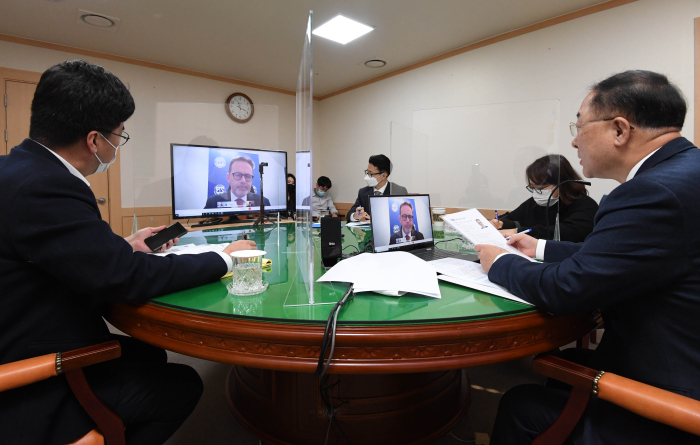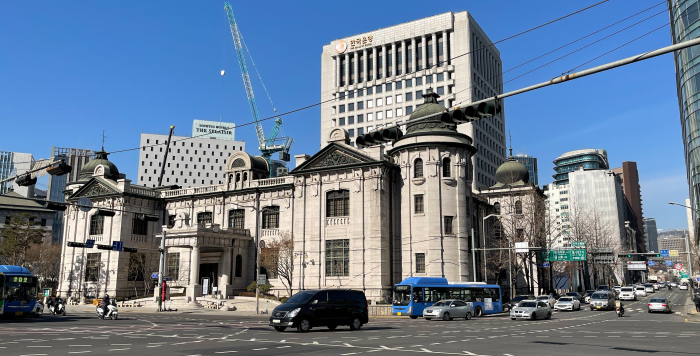IMF warns against South Korea's debt explosion
By Apr 15, 2021 (Gmt+09:00)
LG Chem to sell water filter business to Glenwood PE for $692 million


Kyobo Life poised to buy Japan’s SBI Group-owned savings bank


KT&G eyes overseas M&A after rejecting activist fund's offer


StockX in merger talks with Naver’s online reseller Kream


Mirae Asset to be named Korea Post’s core real estate fund operator



South Korea needs to closely monitor government spending to avoid a future debt explosion given its rapidly aging population, according to a senior International Monetary Fund (IMF) official on Apr. 14.
The country's strong fundamentals, including a robust manufacturing sector and a quality labor force, will keep the debt manageable for now, but health care costs and other liabilities associated with aging pose a concern going ahead, Andreas Bauer, assistant director and Korea mission chief for the IMF, told the Bloomberg news.
His comments were made after South Korea's government debt surpassed its gross domestic product for the first time in 2020, with public debt reaching its highest level ever following pandemic-related fiscal spending.
"You should put fiscal policy into a longer term framework that will make sure the debt will not explode later on when additional liabilities from population aging will arise,” Bauer was quoted as saying in an interview with Bloomberg.
The IMF projected the country's debt-to-GDP ratio to climb to 53.2% this year and to 69.7% by 2026, compared with a decline in the euro area and Japan over the same five years.
The average birth rate in South Korea dropped to a fresh low of 0.84 last year, the world’s lowest. The birth rate is likely to decline further to 0.73 by 2040, pushing the number of senior citizens the average 100 working-age people need to support sharply higher to 76.1 versus this year's 39.7, according to the National Assembly's budget office.
Last year, South Korea drew up four supplementary budgets to fight the COVID-19 economic fallout. Bauer said the fiscal support has been effective in blunting the impact of the pandemic.
“Korea’s economy is highly regulated,” he said. “We know a lot of growth comes from young firms. Some of them start small but they grow quickly. That is what has been maybe missing a little bit in Korea.”
Bauser called for additional policy measures to create jobs and stimulate innovation in an economy dominated by large firms.
In response to the IMF comments, a senior finance ministry official gave a nod to the need of keeping fiscal spending growth in check.
"It is true that our fiscal strength has been exhausted," Second Vice Finance Minister Ahn Do-geol told reporters on Wednesday. "We will rein in spending, taking into comprehensive consideration of the vaccination situation, the economic trends and investments in future growth areas, including the 2050 net-zero emissions goal."
He referred to the carbon neutrality initiative that South Korea has pledged to achieve by 2050, together with other member countries of the United Nation.
The finance ministry has proposed a fiscal rule to cap government debt at 60% of GDP from 2025, pending at parliament. Ahn said the ministry would make every effort for the rule to pass in the parliament.
But he refuted the IMF's warning that South Korea's government debt has been growing at a faster pace than other countries, calling for a further cautious approach to inter-country comparisons.
"The IMF's projection for the US government debt was based on the assumption that the US government spending will be reduced by 12.3% next year. But the recently released US budget for next year showed an increase in government spending," Ahn added.

INTEREST RATES
Separately, another senior IMF official said that South Korea's interest rates remained at the appropriate level, "given the still substantial slack in the economy and the fact that inflationary pressures are not yet in evidence."
"On the financial stability side, we would not recommend raising interest rates to contend with any financial stability risks, including those related to housing," said Jonathan Ostry, deputy director of the fund's Asia and Pacific department during a press briefing on Apr.14.
The Bank of Korea has left its policy rate unchanged at a record low of 0.5% since it delivered two rate cuts last year -- in March and May of -- from 1.75%.
Write to Jin-Gyu Kang and Eu-Jin Jeong at josep@hankyung.com
Yeonhee Kim edited this article.
-
 Debt-to-GDPS.Korea's public debt tops GDP for first time in 2020
Debt-to-GDPS.Korea's public debt tops GDP for first time in 2020Apr 07, 2021 (Gmt+09:00)
2 Min read -
 Dwindling populationS.Korea’s birth rate decline accelerates to world’s lowest
Dwindling populationS.Korea’s birth rate decline accelerates to world’s lowestFeb 25, 2021 (Gmt+09:00)
4 Min read


